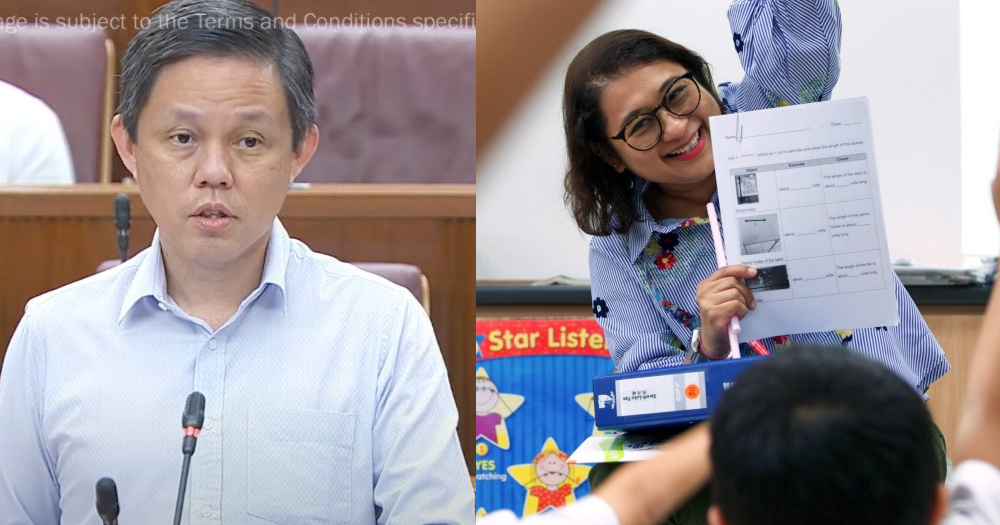Follow us on Telegram for the latest updates: https://t.me/mothershipsg
On Sep. 12, Minister for Education Chan Chun Sing spoke in Parliament about the Ministry of Education's (MOE) efforts to attract and retain good and qualified teachers; through efforts beyond improved remuneration.
Responding to questions from PAP Members of Parliament (MPs) Seah Kim Peng and Hany Soh, as well as Dennis Tan of the Workers' Party, Chan emphasised MOE's efforts to streamline teacher workloads, as well as help ensure the resilience of current and future generations of students.
Not just about salaries and benefits
Chan said that building a quality teaching service goes beyond salaries and benefits.
"MOE values our teachers and pays close attention to their well being and work life balance," Chan said. He paid tribute to the dedicated teachers who went above and beyond the call of duty for their students.
To help teachers manage their workload, schools and teachers have streamlined administrative tasks such as taking attendance electronically and giving schools flexibility to pace the implementation of new initiatives, allowing them to focus on students. Teachers who need greater flexibility in work hours can also apply for part-time teaching arrangements.
Meanwhile, schools have Staff Well-Being Committees have been provided with more resources, like extra funds to hold well-being workshops and online resources for self-care.
Teachers are encouraged to share their concerns with their supervisors, and have access to their school’s Wellness Ambassador, MOE’s in-house professional counselling services, and the 24/7 Whole-of-Government Counselling Hotline for support.
However, parents and the public also play a key role in teachers' well-being, Chan said.
"By respecting teachers’ personal time and minimising non-critical communication with teachers outside work hours, parents and the public can work closely with teachers to establish positive partnerships and set appropriate expectations on the teachers’ responsibilities for our children’s development."
Parental expectations
In a supplementary question, Seah talked about reducing the administrative burden on teachers, and perhaps set clear boundaries on when parents could interact with their children's teachers.
In response, Chan set out the improvements made in Singapore’s Pupil to Teacher Ratio (PTR).
Comparing the 10 year period between 2010 and 2020, Chan said that the PTR of primary schools had gone from 19 to 15, and in secondary schools from 16 to 12; showing good progress in the recruit of teachers, both in quantity and quality.
Chan also noted the increase of allied educators, responsible for helping special needs students, from 960 in 2017, to about 1300 in 2021; and MoE was working to improve numbers.
Need to maintain healthy parent-teacher relations
Chan then addressed Seah's second question, saying not all parents were difficult, just some. But a difficult parent can take up an inordinate amount of time, unfairly depriving others of needed attention.
Chan paid tribute to some Parent Support Groups and alumni groups that helped teachers and schools to manage curriculum questions and were role models for parent teacher relations.
Chan said there was a need for parents to ask what was expected from teachers, and what kind of environment that they wanted to bring their children up in.
He warned that an overemphasis on removing difficulty and uncertainty from students’ lives might hamper their ability to develop the ability to deal with difficult situations.
Clear expectations on the role of teachers are important for healthy parent-teacher relations, and for teachers to manage their time well.
Workloads
In another supplementary question, Tan asked about reviewing recruitment plans to attract more teachers to the profession, as well as increasing non-teaching manpower resources in schools.
Chan acknowledged the tight labour market, and said that people have "many choices", but the government still recognises the importance of investing in education in preparing future generations.
However he added, "I think MOE has been very fortunate that we have been able to recruit our fair share of teachers and to hold the quality bar, and the quantity and the quality must come together."
Chan also said that reducing teacher’s administrative workload was not just a matter of increasing the number of people hired to perform administrative tasks, but also to streamline those processes.
Top image by MCI/YouTube & MOE/Facebook
If you like what you read, follow us on Facebook, Instagram, Twitter and Telegram to get the latest updates.
